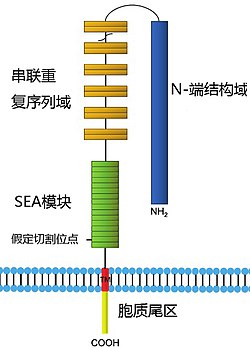CA125
| MUC16 | |||||||||||||||||
|---|---|---|---|---|---|---|---|---|---|---|---|---|---|---|---|---|---|
 |
|||||||||||||||||
| Identifiers | |||||||||||||||||
| Aliases | MUC16, CA125, mucin 16, cell surface associated | ||||||||||||||||
| External IDs | OMIM: 606154 HomoloGene: 133291 GeneCards: MUC16 | ||||||||||||||||
|
|||||||||||||||||
| Orthologs | |||||||||||||||||
| Species | Human | Mouse | |||||||||||||||
| Entrez |
|
|
|||||||||||||||
| Ensembl |
|
|
|||||||||||||||
| UniProt |
|
|
|||||||||||||||
| RefSeq (mRNA) |
|
|
|||||||||||||||
| RefSeq (protein) |
|
|
|||||||||||||||
| Location (UCSC) | Chr 19: 8.85 – 8.98 Mb | n/a | |||||||||||||||
| PubMed search | n/a | ||||||||||||||||
|
|
|||||||||||||||||
n/a
n/a
n/a
n/a
n/a
CA-125 (cancer antigen 125, carcinoma antigen 125, or carbohydrate antigen 125) also known as mucin 16 or MUC16 is a protein that in humans is encoded by the MUC16 gene. MUC16 is a member of the mucin family glycoproteins. CA-125 has found application as a tumor marker or biomarker that may be elevated in the blood of some patients with specific types of cancers, or other conditions that are benign.
Mucin 16 is a membrane associated mucin that possesses a single transmembrane domain. A unique property of MUC16 is its large size. MUC16 is more than twice as long as MUC1 and MUC4 and contains about 22,000 amino acids, making it the largest membrane-associated mucin.
MUC16 is composed of three different domains:
The N-terminal and tandem repeat domains are both entirely extracellular and highly O-glycosylated. All mucins contain a tandem repeat domain that has repeating amino acid sequences high in serine, threonine and proline. The C-terminal domain contains multiple extracellular SEA (sea urchin sperm protein, enterokinase, and agrin) modules, a transmembrane domain, and a cytoplasmic tail. The extracellular region of MUC16 can be released from the cell surface by undergoing proteolytic cleavage. MUC16 is thought to be cleaved at a site in the SEA modules.
...
Wikipedia
